On January 28, DLab Dialog Day 2023 - Designing care for the future society, was held at Tokyo Tech's Hisao & Hiroko Taki Plaza*1 . The event presented the activities of Tokyo Tech's Laboratory for Design of Social Innovation in Global Networks (DLab) over the past year and to reflect on the future we want, together with the rest of society. The event consisted of two parts: a symposium in which a variety of speakers*2 took the stage to weave together seeds, sprouts, and stems for the future, and a co-creation workshop where internal and external participants from the institute collaborated in thinking how care should be provided in the future society. The following is a detailed report of the event, attended by approximately 130 people in total.
- *1
-
The symposium session was also streamed online.
- *2
-
Speakers' and participants' affiliations and job titles are those as of the date of the event.
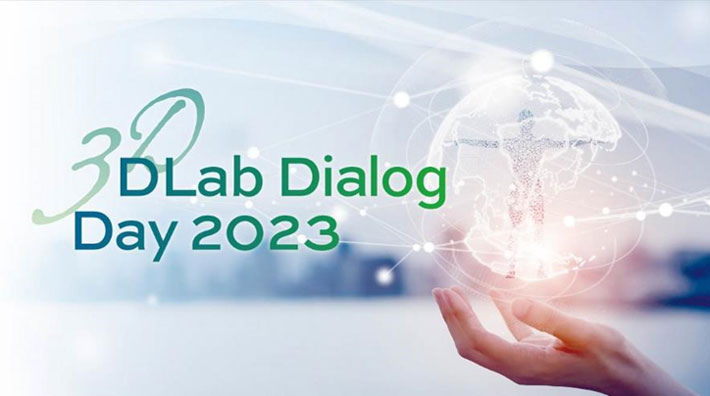
Program
Symposium
- 1.
- "Introduction & Activities" - Presentation of the efforts of DLab in AY2022
- 2.
- "Seeds for our future world" - Students' visions of our future society - Presentation by students of the course "Introduction to the Design of Future Society" and presentation of "DLab Partners" who participated in the lecture
- 3.
- "Future research sprouts" - Paths to the realization of the future image - Research presentations and a panel talk by DLab Challenge Research Grant
- 4.
- "Trunks of future creations" - Anticipating the creation of our future society - Business leaders and researchers discuss research oriented toward our future society; with Yuka Tanimoto, Forbes JAPAN
- 5.
- Closing
Co-creation workshop - Designing care for the future society
- 1.
- Orientation
- 2.
- Keynote speech 1 "Health of the global environment - Focusing on water and climate change -" Professor Shinjiro Kanae, School of Environment and Society, Tokyo Institute of Technology
- 3.
- Keynote speech 2 "Social Determinants of Health: Our health isn't just a matter of willpower" by Professor Jun Aida, Graduate School of Medical and Dental Sciences, Tokyo Medical and Dental University
- 4.
- Group works
- 5.
- Closing
Symposium
1. "Introduction & Activities"
The morning symposium began with opening remarks by Tokyo Tech President Kazuya Masu. President Masu stated that his experience at DLab in discussing the future we want has given him the strength to think in depth about his vision for Tokyo Tech as president and to make drastic reforms. He expressed his hope to the participants that this event would be a meaningful opportunity to think about our future in an exciting way.
DLab Associate Director Naoto Ohtake, Director of the Institute of Innovative Research, gave an overview of DLab and its activities in the 2022 academic year. DLab's approach is: "While engaging in broad dialog with people both internal and external to the Institute, we think about the future that we want to have rather than the future that we should have, and we will also consider the science and technology and policies needed for realization."
He also explained the 24 "future scenarios" of a future we want that have been developed through dialog with the society, the "Tokyo Tech Future Chronology" that organizes the scenarios in chronological order, and the Vision 2020 "Transchallenge" that changes the concept of a "challenge" by creating a system that accept failure in an embracing manner.
2. "Seeds for our future world": Our future society as envisioned by students
As one of its activities, DLab emphasizes "outreach and awareness to society and the next generation," and has developed a course for undergraduate students, "Introduction to the Design of Future Society." In the second session, "Seeds of Future Society," students presented their visions for the future society.
This course is taught by Professor Hiroichi Yanase and Associate Professor Renge Jibu, who belong to Tokyo Tech's Institute for Liberal Arts and are members of DLab. The students formed groups to discuss a vision of the world they would like to live in when they turn 50 in 2050, and publish it in the form of a newspaper. Members of DLab Partners, a group of companies that support DLab's activities, have also participated in the class, providing information from a corporate perspective and helping to engage in dialog with the students.
After Professor Yanase gave an overview of the course and DLab member Hajime Nitta, Senior URA (Head of Research Development Section, Office of Research and Innovation), introduced the DLab Partners activities for the 2022 academic year, the student groups presented a newspaper on the following seven topics created in the course.
- "Health and welfare": Depicts the care of humans by clones of themselves, the advent of artificial eyes with zoom function, and the use of regenerative medical technology to improve the quality of sleep and mechanize people.
- "Abundance from our ocean": An article posted described that in our future 60% of sushi is made from farmed or cultured fish meat, a daycare center is attached to a conveyor-belt sushi chain restaurant, and the start of real-world implementation of seawater desalination technology.
- "Diversity": News coverage of a generative AI based on data from people with diverse backgrounds becoming CEO of a global IT company, introduction of "LGBTQ+ quota" in university entrance exams to create a diverse student body, etc.
- "Hunger": Envisions a global future where the number of people suffering from hunger becomes less than 10,000 thanks to technologies that recombine the components of garbage into food, accelerate crop growth, and smart agriculture.
- "Urban development": Presenting a future of city both in terms of residence, such as migration to Mars and artificial satellites, and in terms of lifestyle, such as the advent of small cabs with fully autonomous driving.
- "Energy": Posting news such as the start of power supply to artificial satellites for immigration by solar power generation on the moon after converting all the energy required on Earth to renewable energy.
- "Foundations of industry and technological innovation": Introduction to topics as diverse as the elucidation of human consciousness, migration to virtual space, the opening of a space elevator, and the advent of AI legislators.
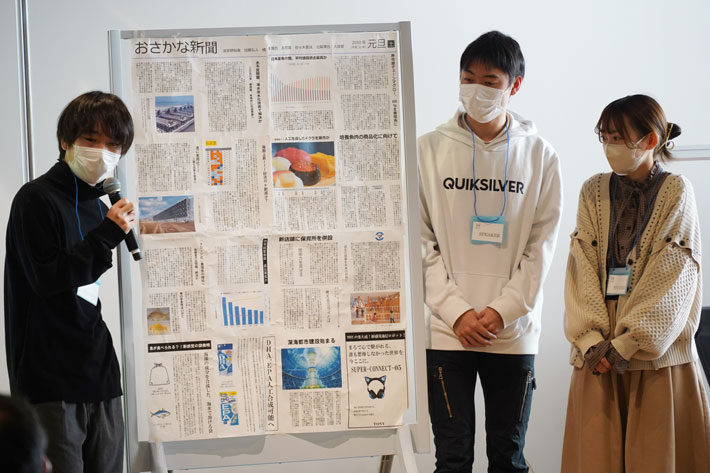
Students presenting on the topic "The Abundance from our ocean"
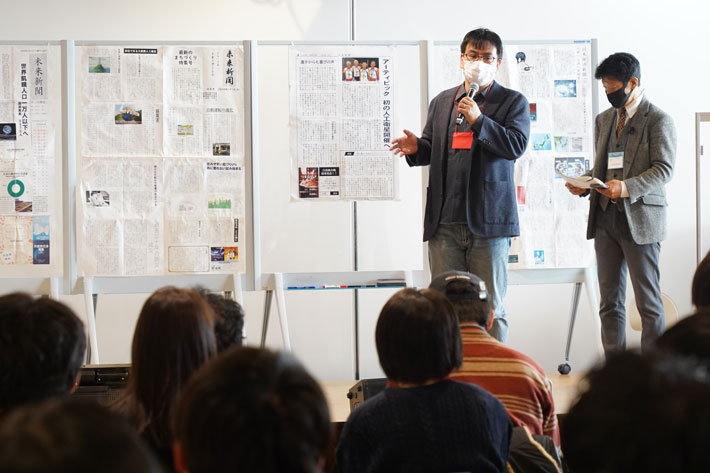
DLab Partners members and Professor Yanase (right) commenting on the presentation.
In between each group's presentation, Associate Professor Jibu, moderated the key points of each group's presentation. During the free dialog session held after, Professor Tamio Nakano from the Institute for Liberal Arts, who launched the course, said the act of seeking answers to questions for which there are no correct answers, and "envisioning the future we want," will lead to the realization of that future. In addition, many comments were received from members of DLab Partners and Tokyo Tech faculty members.
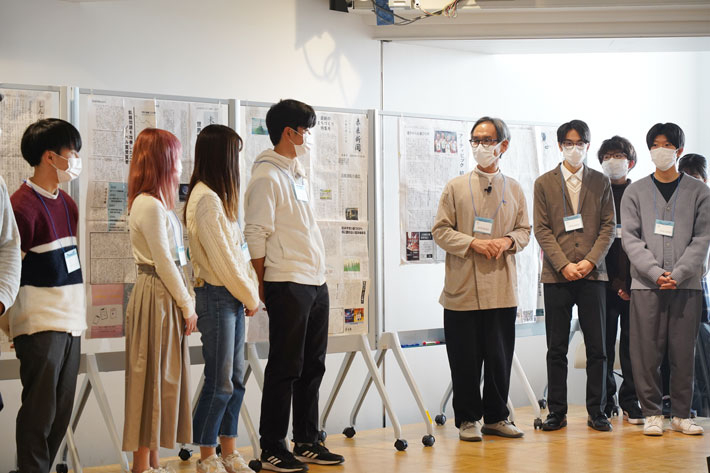
Professor Nakano (center right) commenting on the newspaper, and students who took the course.
3. "Future research sprouts": Paths to the realization of the future image
DLab has been supporting research that leads to the realization of Tokyo Tech's future scenarios through the DLab Challenge Research Grant. The "Future research sprouts" session featured presentations and panel talks on research newly supported in the 2022 academic year.
Development of PFOS treatment technology for solving the environmental problems originating to US military bases
Principal Investigator: Associate Professor Toshihiro Isobe, Department of Materials Science and Engineering, School of Materials and Chemical Technology
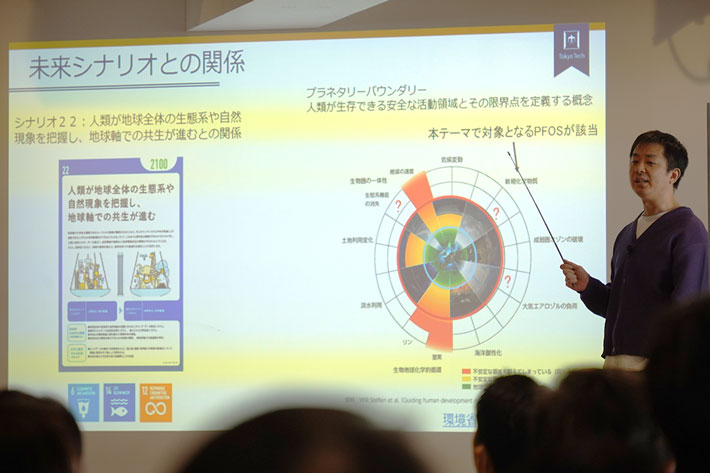
Presentation by Associate Professor Isobe
Through the development of a removal system for persistent organic pollutants and PFOS, a global environmental issue, and through interdisciplinary research consisting of an investigation of the actual problems caused in the neighborhood of U.S. military base as one of the emission sources, we examine the potential for new technologies to solve societal issues.
Exploring spatial position control technologies that maximize experience sharing in VR and emerging styles of human interaction practices
Principal Investigator: Associate Professor Kotaro Funakoshi, Institute of Innovative Research
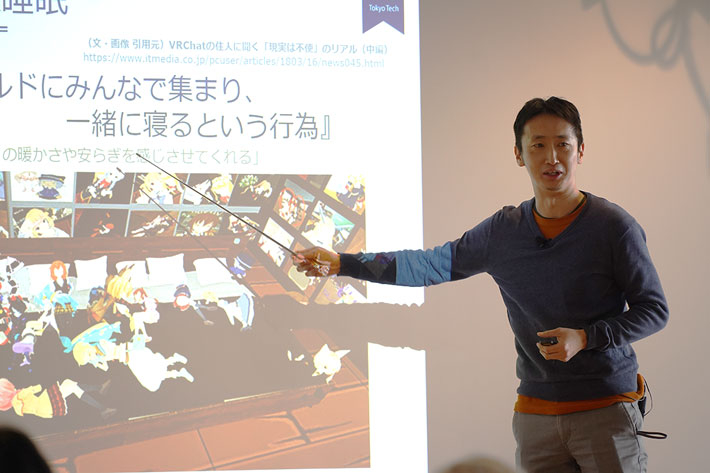
Presentation by Associate Professor Funakoshi
This project explores ways to overcome the various physical and environmental barriers that exist in VR spaces (e.g., restrictions on avatar behavior due to control interfaces) through collaboration among researchers in engineering and the humanities from various fields, and create a VR world where everyone can interact and challenge themselves without stress.
No victim left behind: Transdisciplinary design research for future megathrust earthquake and Tsunami through cosmic-eye view
Principal Investigator: Associate Professor Takumi Ohashi, Department of Transdisciplinary Science and Engineering, School of Environment and Society
*Assistant Professor Takashi Tomura, Department of Electrical and Electronic Engineering, School of Engineering, a co-researcher, is in charge of the presentation.
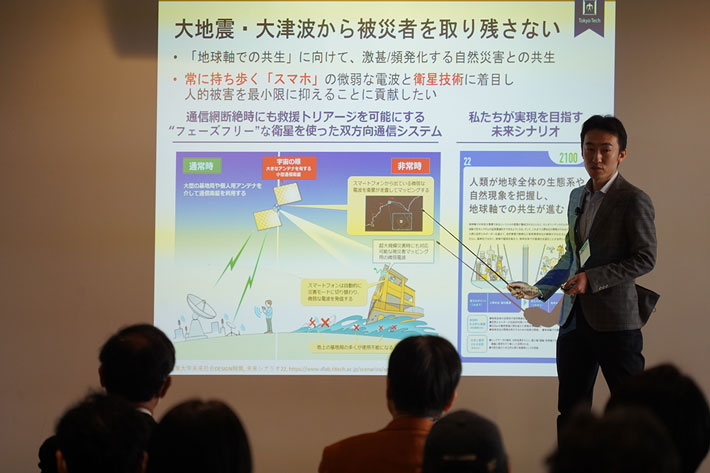
Presentation by Assistant Professor Tomura
By connecting next-generation communication satellites which can switch between normal and disaster phases with smartphones, the population distribution of disaster victims can be quickly determined in the event of a large-scale disaster by capturing the weak radio waves emitted by smartphones. The project also examines methods of social implementation through transdisciplinary research.
After the presentations, a panel talk was held, moderated by Deputy Director Ohtake, with DLab members Takao Kuramochi, Deputy Director-General, Center for Research and Development Strategy, Japan Science and Technology Agency, Vice President Noriyuki Ueda, (for collaboration in liberal arts and STEM), and Vice President Kaoru Kuwata (for research development).
In a way related to the event's topic of "Designing care for the future society," he said "The true well being of society is achieved through investigating the overlap of technology with people's emotional pain and value for life. I sensed these ideas in the three topics presented," and "I felt that science and technology are reaching a level where they can achieve the happiness of each and every human being."
4. "Trunks of future creations" - Anticipating the creation of our future society -
In the "Trunks of future creations" session, moderated by Yuka Tanimoto, executive officer and web editor-in-chief of Forbes JAPAN, the Japanese edition of the global economic magazine, business leaders and Tokyo Tech researchers discussed the path to creating the future.
DLab member, Junko Mokuno, Vice president of Trail INC., first explained the purpose of the event, and then Ms. Tanimoto gave the direction of the talk, saying she would like to think about methodologies to envision the future we want through dialogue, before introducing the panelists' activities.
The first to introduce his activities was Mr. Yuki Tazaki, Founder & CEO of KANDO, engaged in designing innovative technologies for real world implementation that can change our world. Mr. Tazaki spoke about his involvement in a medical cyborg venture that he supported as a member of a venture capital firm, as well as his efforts to address the issues of sea level rise and seawater damage through his marine construction project at N-ARK Co. Ltd, where he serves as the president.
Associate Professor Hiraku Sakamoto, School of Engineering explained his own research aimed at building large space structures and the Engineering Design Project, a problem-solving course he teaches at the graduate school. Working with students from a variety of universities, including schools of arts and design and women's colleges, as well as Tokyo Tech, participated in this lecture, in which they conducted user surveys and made prototypes, aiming to create new user value in line with the theme of the company.






